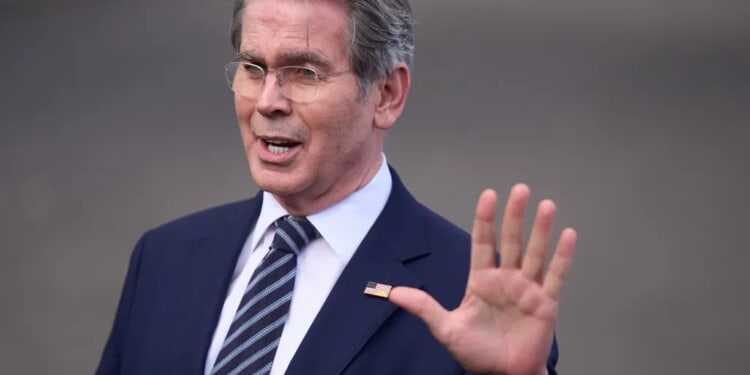Treasury Secretary Scott Bessent on Sunday suggested illegal immigrants are partly to blame for fueling cattle infections in Mexico that have contributed to high beef prices in the United States.
In recent months, U.S. consumers have seen a sharp uptick in beef prices due partly to screwworm outbreaks that have affected cattle imports from Mexico.
Over the weekend, Bessent argued South American migrants who made their way to the U.S. under the Biden administration bore some responsibility for the screwworm outbreaks. Migrants brought infected cattle with them on the journey, the treasury secretary said, carrying the flesh-eating parasite to North America, and destabilizing the beef market, a critical U.S. import from Mexico.
“Because of the mass immigration, a disease that had been we’ve been rid of in North America made its way up through South America as these migrants — they brought some of their cattle with them,” Bessent said during the Fox News Show Sunday Morning Futures.
“So part of the problem is we’ve had to shut the border to Mexican beef because of this disease called the screwworm, so we’re not going to let that get into our supply chain,” he added. “It’s a very important product, and we are laser-focused on this issue. … The beef market is a very specialized market. It goes in long cycles, and this is the perfect storm, again, something we inherited.”
Nationwide droughts in the U.S. affecting vital ranching areas have also hurt cattle inventories, with the combination of factors spiking beef prices by about 13% over the past year, according to data released in August from the Labor Department. Prices for ground beef are the highest on record.
Last month, President Donald Trump floated buying more beef from Argentina to help lower prices. The White House said at the time that the U.S. is quadrupling the country’s imports of Argentine beef to help lower grocery store beef prices.
In an effort to address general food affordability, the Trump administration is also rolling out new tariff exemptions designed to lower costs on goods such as coffee and fruits.
“Exemptions are accordingly set to be granted following a spate of new trade deals being inked with some of our biggest allies in the western hemisphere, in addition to the deals that President Trump has already secured with the EU, Japan, the UK, and other major trading partners,” a White House spokesman told the Washington Examiner last week.
Bessent referenced protracted concerns about the cost of living on Sunday. He expressed confidence that a host of provisions within Trump’s sweeping “One, big, beautiful” bill, which contained tax cuts, would help fuel lower prices. Trump signed the legislation into law over the summer.
“I will tell you what we’re not going to do. What we’re not going to do is tell the American people that they don’t know how they’re feeling, which is what the Biden administration did,” the treasury secretary told host Maria Bartiromo. “They said it was a vibe session. ‘You don’t know how good you have it.’”
WHAT CAN TRUMP DO TO HELP COST OF LIVING BEFORE MIDTERM ELECTIONS
“The real thing that is going to happen that is going to give American purchasing power increases — it’s going to be through growth. We passed the One Big, Beautiful Bill. I am also the IRS commissioner, and I can see that working Americans, thanks to the president living up to his campaign promises — no tax on tips, no tax on overtime, no tax on Social Security. Deductibility of auto loans, if you buy an American car. There are going to be substantial refunds,” Bessent said.
“In the first quarter of ‘26,” he added, “working Americans will change their withholdings, and they will get a bump up in their real incomes. So I would expect in the first two quarters, we are going to see the inflation curve bend down and the real income curve substantially accelerate, and when those two lines cross, Americans are going to feel it.”
















